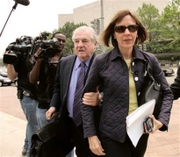CIA operative's name. Another reporter, Matthew Cooper of Time magazine, agreed to talk and avoided jail.
"I do not view myself as above the law," Miller told U.S. District Judge Thomas Hogan. "You are right to send me to prison."
But she said she had an obligation to protect a confidential source: "I do not make confidentiality pledges lightly, but when I do I must honor them."
Hogan was adamant that Miller comply with the court's order to testify.
"If she was given a pass on this, the next person who comes up" might refuse to cooperate as well, Hogan said. "There is still a realistic possibility that confinement might cause her to testify."
Cooper said his source had given him a waiver just before the court session, enabling the journalist to cooperate with the probe into who leaked the name of CIA officer Valerie Plame. Cooper said that he had been prepared to go to jail and that on Tuesday night, "I hugged my son goodbye and told him it might be a long time before I see him again."
Hogan held the reporters in civil contempt of court in October, rejecting their argument that the First Amendment shielded them from revealing their sources. Last month the Supreme Court refused to intervene.
The Miller-Cooper case has been seen as a test of press freedom, and numerous media groups have lined up behind the reporters. Thirty-one states and the District of Columbia have shield laws protecting reporters from having to identify their confidential sources, though there is no federal protection. Congress is considering a bill, however, and Cooper and others involved in the case have urged passage.
Unless she decides to talk, Miller will be jailed until the grand jury ends its work in October. Hogan speculated Miller's confinement might cause her source to give her a more specific waiver of confidentiality, as Cooper's source had.
The judge did not say where she would be incarcerated, but she was seen entering the Alexandria Detention Center. The Virginia facility's best-known resident is convicted terrorist Zacarias Moussaoui.
Special counsel Patrick Fitzgerald is investigating the question of who leaked the identity of CIA officer Plame. Disclosure of an undercover intelligence officer's identity can be a federal crime if prosecutors can show the leak was intentional and the person who released that information knew of the officer's secret status.
 | Plame's name was disclosed in a column by Robert Novak days after her husband, former Ambassador Joseph Wilson, questioned part of President Bush's justification for invading Iraq. |
Wilson was sent to Africa by the Bush administration to investigate an intelligence claim that
Saddam Hussein may have purchased yellowcake uranium from Niger in the late 1990s for use in nuclear weapons. Wilson said he could not verify the claim and accused the administration for manipulating the intelligence to "exaggerate the Iraqi threat."
Novak, whose column cited as sources two unidentified senior Bush administration officials, has refused to say whether he has testified before the grand jury or has been subpoenaed. Cooper's story mentioning Plame's name appeared after Novak's column. Miller did some reporting, but never wrote a story.
Among the witnesses Fitzgerald's investigators have questioned are Bush; Vice President
Dick Cheney; Bush political adviser Karl Rove; Cheney's chief of staff, Lewis Libby, and former White House counsel Alberto Gonzales, who is now the attorney general. Fitzgerald has said his probe is finished except for hearing from Miller and Cooper.
"If somebody broke the law to get back at Mr. Wilson, every eyewitness should come forward to testify," Fitzgerald told Hogan. "The grand jury wants to know the truth. We are having the whole thing derailed by one person."
Pointing to broader implications, Fitzgerald said that "we can't have 50,000 journalists" making their own decisions about whether to reveal sources.
After Hogan passed judgment, Miller stood up, hugged her lawyers and was escorted from the courtroom, touching Cooper on the hand as she passed by.
Asked why prosecutors sought Miller's testimony when she never wrote a story about Plame, Times attorney Floyd Abrams said, "We don't know, but most likely somebody testified to the grand jury that he or she had spoken to Judy."
Keller said he did not know why Miller never wrote a story, adding, "I guess she didn't feel she had enough to go with at the time."



No comments:
Post a Comment